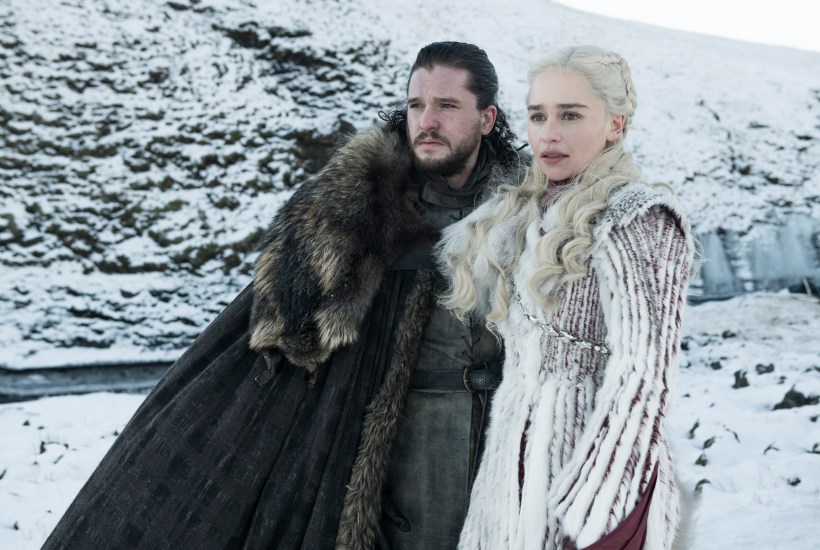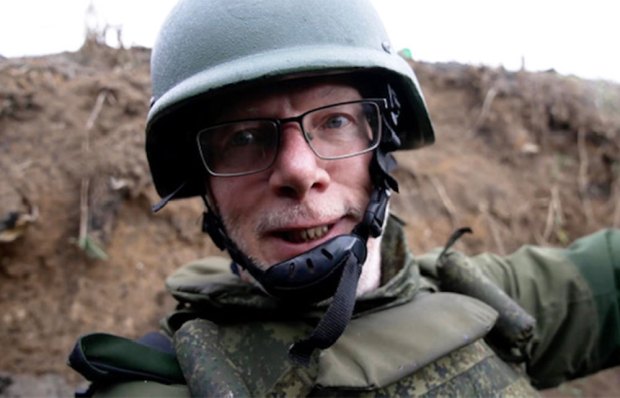By the time you read this, James Delingpole and I will have made our first podcast in 596 days. That’s the length of time that elapsed between the last episode of Game of Thrones and the new one broadcast on Monday night. Yes, that’s right, we have our very own Thronecast in which we dissect every instalment of the long-running saga.
This isn’t exactly original. Every self-respecting broadcaster has a Thronecast these days. There’s even a Thronecast Shopping Network where you can buy miniature iron thrones for your mantelpiece. Although why anyone would want to is a mystery. The era when the series enjoyed cult status is long gone. Last Sunday’s episode attracted a record-breaking 17.4 million viewers in America alone and its global audience is many times that. It’s hard to feel a sense of ownership of something so widely shared.
The only thing that’s different about the Delingpole-Young Thronecast is that we don’t pretend to have a clue what’s going on. Game of Thrones is notoriously difficult to follow because it has so many characters and plot lines. One minute you’re in a cave with the Three-Eyed Raven; the next, you’re in the Great Hall at Winterfell as Jon Snow tries to rally his banner men. A minor character called Gendry completely disappeared at the end of season three, then popped back up at the beginning of season seven.
When a major character dies you breathe a sigh of relief and think, ‘At least I don’t have to keep track of that bastard any more’, only for said bastard to be brought back from the dead in the next episode. There are even three characters with almost identical names: Bronn, Bran and Brienne. Thanks a lot, guys!
All the Thronecast hosts feel obliged to constantly advertise their mastery of this material, although you know there’s an army of nerds off-camera feeding them information. No mere mortal could possibly stay on top of it all.
James and I used to employ a human computer with an encyclopaedic knowledge of the show who would jump in whenever we got a character’s name wrong or mixed up a plot line, but this happened so often we could barely complete a sentence. It eventually dawned on us that there’s no shame in not being able to remember everything. That is true of 99 per cent of the show’s viewers, after all. So we gave up trying to disguise our ignorance and began to flaunt it. Who knows what happened to Samwell Tarly at the end of season six? Who cares? At that point, our little Thronecast really took off. We went from an average of two listeners per show to at least four.
The downside is that when you stop spending all your time trying to work out what’s going on — when you’re no longer intimidated by the sheer mind-boggling complexity of it — Game of Thrones begins to lose its lustre. In fact, you realise just how terrible some of the plot lines are. For instance, in season seven a group of battle-hardened warriors led by Jon Snow venture into the badlands beyond the wall to try to capture a ‘white walker’ — a zombie, essentially. They do this to convince Cersei Lannister, the current occupant of the iron throne, that these supernatural creatures really do exist, in the hope of persuading her to make common cause with them against the oncoming horde of the undead.
But why would Cersei be so sceptical, given that her chief bodyguard is himself a zombie? And why would Jon Snow and his merry men be so dumb as to think they could form any sort of alliance with Queen Cersei, the show’s most untrustworthy character? It’s ludicrous, just an excuse for an endless succession of set pieces. And it dawns on you that this is symptomatic of the whole saga: plot coherence is nearly always sacrificed for spectacle. It’s basically a Bollywood musical, but with tits and dragons instead of singing and dancing.
Still, I’m going to stick with it, not least because I’ve watched all 68 episodes so far and there are only five to go. You cannot spend that long with a series and not care what happens to the characters. I also want to know who ends up on the iron throne at the end. I’m hoping it’s Gendry because at least then there would be some logic to resurrecting his character after a three-season hiatus. But it won’t be, obviously, because logic plays very little part in Game of Thrones.
Got something to add? Join the discussion and comment below.
Get 10 issues for just $10
Subscribe to The Spectator Australia today for the next 10 magazine issues, plus full online access, for just $10.
You might disagree with half of it, but you’ll enjoy reading all of it. Try your first month for free, then just $2 a week for the remainder of your first year.















Comments
Don't miss out
Join the conversation with other Spectator Australia readers. Subscribe to leave a comment.
SUBSCRIBEAlready a subscriber? Log in